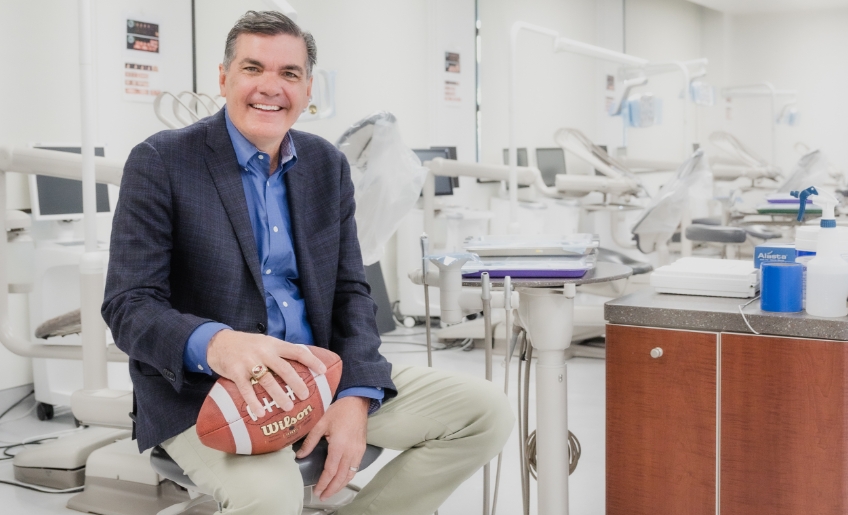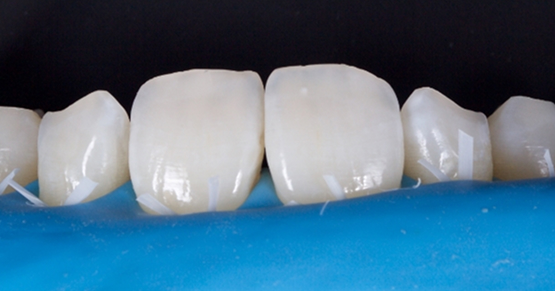A Lesson in Leadership: Dr. Mark Sutor

For Dr. Mark Sutor, it often comes back to football.
As a periodontist in Bloomington, Indiana, Dr. Sutor is a leader in the local dental community. And as a lecturer and a contributor to Spear Online courses and workshops, he has developed a reputation as a naturally compelling and inspiring presenter. Ask him about his affinity for helping others achieve ideal success, and he brings it back to his younger years on the football field.
“I go back to my sports experience a lot,” he says, “because I think it’s taught me so much. Not just about being an athlete, but also about team dynamics and leadership and the value of elevating those around you. I was always a quarterback as a kid. And the quarterback’s the leader of a football team. So I think that leadership mentality is just who I am, I just took to that. I think I’ll always have the quarterback mentality. I like to be a leader.”
It’s a mindset that was evident early on in his clinical career. After completing his training at Baylor College of Dentistry in Dallas, and receiving his master’s degree at the University of Kentucky in Lexington, he opened his own periodontics practice in Bloomington in 1991, and quickly became a driving force in the dental community there.
“I saw this opportunity in Bloomington to be a leader in our community, and to maybe even change the way some of the clinicians in the area viewed dentistry and treated patients. And I really think the quality of our dentistry, as a community, has really grown nicely over the years. I’m not saying that our group is solely responsible, but I do think there’s now a lot of really good dentistry being done in this small community that I didn’t see when I first moved here, and I like to think our group has contributed to that.”
Leadership through Study Clubs
When he talks about “our group,” Dr. Sutor is talking not just about the community of clinicians he works with in general, but in particular the members of his study club. He has been a Spear Study Club leader since 2013, but he started his first club well before that. In fact, in keeping with his style of leadership, when he started his first club 30 years ago, it was the first in Indiana — and there were doubters.
“Being in a small community, some people didn’t see how it would work,” Dr. Sutor remembers. “I just thought, ‘Well, I think it’ll be good.’ And then I watched as other practitioners began starting their own clubs. Which I think is great, but I was pretty proud of the fact that we were the very first one in the whole state.”
And how is it he came to appreciate early on the value of a study club environment? Once again, it comes back to the theme of leadership and having the right influencers.
“One of my early mentors in periodontics was Dr. Mark Thomas, back in Lexington,” Dr. Sutor says. “He’s the one who taught me the value of the study club, in his own informal way. He would just have dentists show up at his office. He’d be sitting at his desk, had a little projector and slides he projected on the wall, and he’d just talk about how to treat these people. Sometimes he’d lecture purely on perio, sometimes a dentist would bring things in that would be discussed as a group. And I was just fascinated by what he was doing. I loved the way he took this leadership role and I thought, ‘This is really smart — what a cool way to make a difference in your professional community.’ ”
Leadership in case presentations to patients
One area where every practitioner has to display leadership is when it comes to presenting treatment to patients. Dr. Sutor has found that the ongoing education he’s received over the years at Spear has helped him be a better leader to his patients.
“One thing that sticks out for me, in terms of what I’ve learned from Spear, is having a succinct approach to treatment planning and case presentation. It’s that reliable formula of saying, ‘Here are my findings, here’s what the benefit of treatment is, and here’s the possible downside of not doing treatment.’ I use that about every day now, whether it’s a minor procedure or a comprehensive case.
“It sounds really simple, but that kind of confidence in presenting is an acquired skill, and that’s what I can attribute to my time with Spear. I have this confidence now where I don’t think there’s anything I can’t handle,” he says. “That doesn’t necessarily mean I can treat it, but I can at least diagnose it. I can explain to patients why they’re in the condition they’re in. I’m not pushing anything on them. I see myself as an advisor and a coach to my patients. And it’s an approach I have had a lot of success with.”
Leadership in times of crisis
Shortly after the Covid-19 pandemic disrupted our lives, Dr. Sutor was enlisted to be a part of a special Spear advisory board of leading clinicians from across the country — a group of specially selected practitioners whose mandate was to brainstorm, advise, and give feedback on quickly emerging strategies for navigating the uncharted waters of the pandemic. For him, it was a memorable experience.
“I love the fact that Spear put a bunch of people together like that. Just being around like-minded people — people with a desire to lead and find ways to be successful in challenging times — was motivating. I loved the meetings and the heady discussion we had in a time when, throughout the nation, people were scrambling to figure out what to do. I’m glad I got to be a part of that process of providing timely information to people in the Spear world. And to be honest, I’m not sure how I would have come through that time, how I would have positioned myself, if I hadn’t been a part of that group.”
Another thing Dr. Sutor came away with during that time was a new appreciation for the value of virtual learning. Spear workshops and courses, Study Club meetings — it all moved online, and it’s a shift in thinking that looks like it’s here to stay. And as much he appreciates in-person interaction, Dr. Sutor is quick to see the value of the online experience.
“I think virtual courses give you a greater depth to capture people who otherwise wouldn’t be attending in person, so I think it broadens the exposure and ability to educate people. There’s more flexibility since you can do it from home or the office, and you don’t have to worry about the expense of travel and being out of office. And some people, quite frankly, are probably drawn to that method of learning — people who may be shy and avoid in-person workshops, for instance. For them, virtual learning can end up being a gateway to other educational experiences.
“And I would add that Spear has done a great job of translating the Spear ‘experience’ to their online learning. What you get in the virtual courses is the typical Spear quality — and I can say that as a participant as well as a presenter.”
Leadership in team alignment
Dr. Sutor is not just a leader in his clinical community; a large part of his success comes from his ability to motivate and lead his team. He has brought his team with him to workshops at the Spear campus in Scottsdale, where they’ve had valuable bonding experiences. He also has implemented a number of strategies, including regular team meetings to keep everyone on track. And he has enthusiastically embraced the concept of having a professional relationship director to drive relationships with referrers — a role entrusted to Joanna, a longtime employee.
“The whole idea of introducing the PRD role has been a huge success,” he says. “And what I really like is that Spear has given us a structure for defining the role so all the expectations are clearly laid out. I think people like to have a well-defined structure. For instance, the concept of ‘value roles’ has been great and I use it with all the roles in the practice. But in particular with Jo in the PRD role, it’s given me as a leader direction to make her accountable. I think that’s a really great tool for managing a PRD’s success.”
“And because Spear offers ongoing coaching for PRDs, I find it’s a synergistic process. I can take the value of what I’m learning with Spear and I find it dovetails nicely with what Jo is learning in her Spear group. I would say it’s a synergistic benefit.”
A legacy of leadership
“The older I get, I think that’s just kind of who I am. I’m a coach. I’m a leader. I’m a mentor. And I like that.”
For Dr. Sutor, leadership is not a task to be performed; it’s a way of embracing life. In a way, he feels, it’s an approach to life that had its roots in his family background.
“I have two brothers and the interesting thing is, we’re all coaches or teachers of some kind. One is a Hall of Fame baseball coach in Illinois. The other is an alcohol and drug counselor. And my nephew now is a phenomenal life coach who does all these really great videos for people who stutter — I’m super proud of what he is accomplishing as a leader in that field.
“I think maybe there’s something about not having a father growing up that motivates you to be a better person, to want to fill that void for someone else. My brothers and I grew up without a dad and I think there must be something about growing up in that environment that has kind of guided us into this type of calling.”
And Dr. Sutor does see leadership as a lifelong passion. His first experience with being a leader goes back to those early football days, and he hopes the influence of his leadership will be what he’s ultimately remembered for among his colleagues for many years to come.
“When I think about the idea of giving meaning to your life, I remember someone once saying, ‘What would you like your eulogy to sound like?’ And for me, I would want people to say that I’ve had some kind of a positive impact on their lives, that I’ve shown them ways to grow.
“And, you know, the more energy I put into that, the more I get back, in an exponential way. It really is a great feeling to be able to provide that motivation to others. The older I get, I think that’s just kind of who I am. I’m a coach. I’m a leader. I’m a mentor. And I like that.”
VIRTUAL SEMINARS
The Campus CE Experience
– Online, Anywhere
Spear Virtual Seminars give you versatility to refine your clinical skills following the same lessons that you would at the Spear Campus in Scottsdale — but from anywhere, as a safe online alternative to large-attendance campus events. Ask an advisor how your practice can take advantage of this new CE option.

By: Dan Weber
Date: January 21, 2022
Featured Digest articles
Insights and advice from Spear Faculty and industry experts


